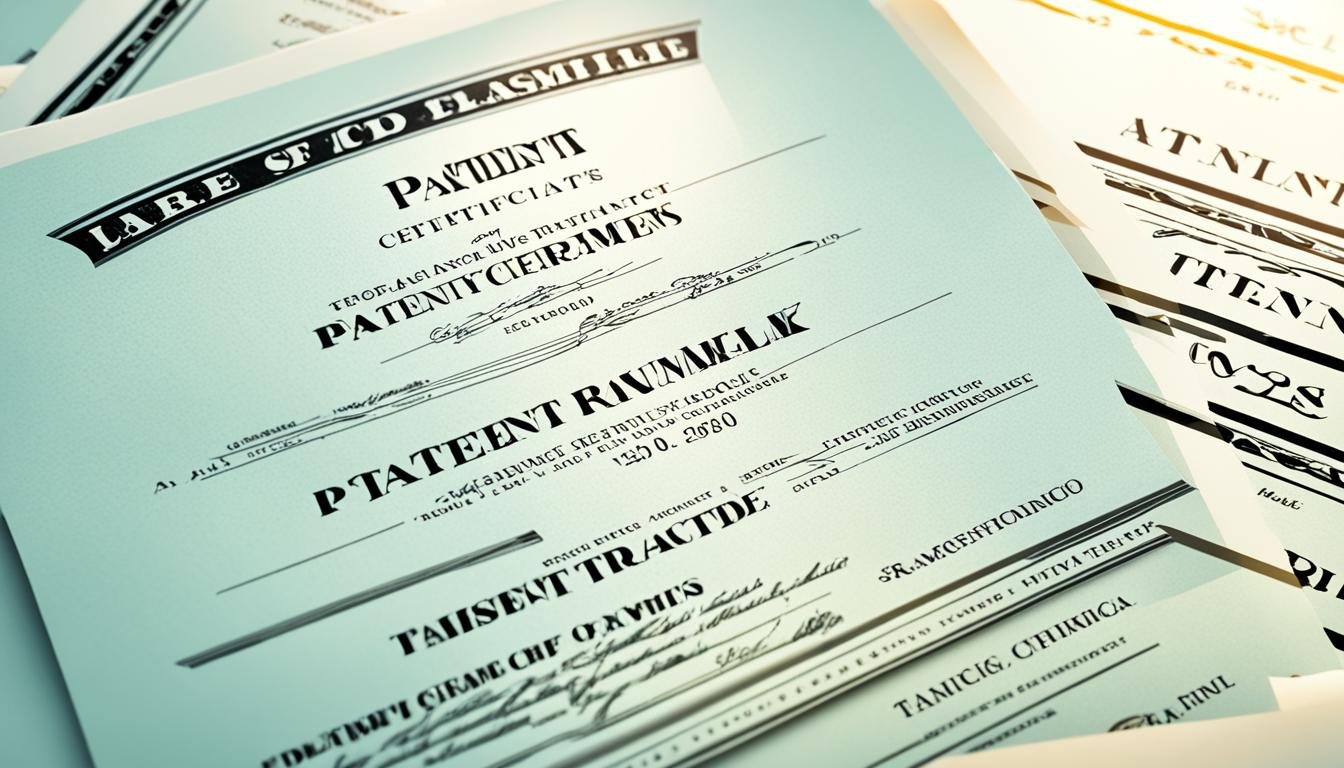Did you know design patents are both quick to issue and cost-effective? This makes them a great choice for companies. Despite common beliefs, these patents are strong and defendable. They’re sought after in many sectors, like healthcare and fashion. A famous case is Apple’s win against Samsung. This story shows us how patents and trademarks can open big doors for businesses.
Key Takeaways:
- Design patents provide quick issuance and cost-effectiveness, making them attractive options for businesses.
- Contrary to misconceptions, design patents are highly defensible.
- Design patents have broad appeal across industries, including healthcare and fashion.
- Apple’s legal victory over Samsung exemplifies the power of design patents.
- Understanding the true value of patents and trademarks is crucial for leveraging their potential.
The Importance of Trademark Valuation
Trademarks are valuable assets that contribute to your company’s success. However, understanding the true value of trademarks can be challenging. That’s where trademark valuation comes into play. By assessing the worth of your trademarks, you can make informed decisions, drive strategic initiatives, and protect your brand.
Brand valuation is a critical aspect of trademark valuation. It involves determining the financial value of your brand and assessing its intangible assets. This process provides insights into the market position, consumer perception, and potential growth opportunities associated with your brand.
Trademark valuation serves various purposes, including:
- Strategic decision-making: Understanding the value of your trademarks helps you align your brand with your long-term business objectives. It enables you to identify the most valuable trademarks and focus your resources accordingly.
- Transactions: Whether you are acquiring or divesting trademarks, knowing their value is essential for negotiating fair deals and assessing the risks and benefits involved.
- Financial reporting: Accurate trademark valuation is crucial for financial reporting purposes, ensuring compliance with accounting standards and providing transparent information to stakeholders.
- Tax planning: Valuing your trademarks helps you optimize tax strategies and manage your tax liabilities effectively.
- Litigation: In the event of trademark disputes, having a proper valuation can provide objective evidence to support your claims.
When it comes to trademark valuation, different methods can be utilized, including:
- Cost-based approach: This method evaluates the cost required to recreate or replace the trademark. It considers development costs, registration fees, and maintenance expenses.
- Market-based approach: This approach looks at prices of similar trademarks sold or licensed in the market. It uses market data and transactions to value your trademarks.
- Income-based approach: Here, the value of your trademarks is based on the income they generate. Projected revenue, licensing fees, and royalty rates are considered.
When valuing trademarks, it’s important to consider factors that can impact their worth. Brand equity, which reflects the strength and reputation of your brand, and goodwill, which represents the intangible value associated with customer loyalty and brand recognition, are crucial considerations. Furthermore, trademarks play a significant role in mergers and acquisitions, enabling companies to differentiate themselves in the market and providing legal protection for their brand assets.
To illustrate the power of trademarks, take a look at the legal battle between Apple and Samsung. Apple’s ability to successfully defend its design patents showcased the value and importance of trademarks in protecting inventions and ensuring IP rights enforcement.
“Trademarks are like a shield for your brand, protecting it from infringement and unauthorized use. Through trademark valuation, you can unlock the true value of your trademarks and make informed decisions that shape the future of your business.”
By understanding the importance of trademark valuation and leveraging appropriate valuation methods, you can maximize the value of your trademarks, protect your brand, and optimize your overall IP strategy.

IP Valuation: Assessing the Worth of Intellectual Property
Intellectual property (IP) assets are very important in figuring out a company’s value. It’s key to know how much these invisible assets are worth for making big decisions, reporting finances, and using them to their full potential. Valuing IP means using different ways to figure out how much patents, trademarks, and other IP is worth.
Different methods are used for IP valuation to get a full view. Cost-based looks at how much it costs to create the IP, like money spent on research. Market-based checks out how much similar IP is worth based on sales and deals. Income-based tries to guess future earnings from the IP, considering things like licensing and royalties.
Valuing IP is done for many reasons. It helps companies make smart decisions by knowing their IP’s value. This lets them pick which IP to focus on, use resources wisely, and create a strong IP plan that matches their goals.
IP valuation is crucial for deals like mergers, licensing, and selling IP. Knowing the IP’s real value helps in making fair deals, understanding risks and rewards, and setting the right fees for licensing or selling. It’s key for protecting legally, standing out in the market, and keeping IP rights.
It’s also important for financial reports and planning taxes. Valuing IP correctly helps businesses meet accounting rules, make tax plans better, and follow regulations. It makes things clear and gives proof of IP’s value and effect on finances and taxes.
In lawsuits involving IP, having a correct value can make a big difference. It can support a claim and help figure out damages. Good valuation methods back up lawsuits, helping to protect inventions, trademarks, and secrets.
Getting the IP value right needs expertise and a deep understanding of the market, industries, and laws. Using experts in IP valuation can make sure the assessment is detailed, trusted, and follows best practices.

The Importance of IP Valuation
IP valuation unlocks the true worth of intellectual property assets, enabling businesses to make informed decisions, negotiate fair deals, and protect their inventions and trademarks.
Take this example: a tech company gets an offer from someone wanting to buy some patents. Without knowing the patents’ real worth, it’s hard to see how good the deal is. This can lead to missed chances, lowball offers, or bad licensing deals.
By valuing their IP well, the company can talk confidently, show their patents’ market value, and get a fair deal. IP valuation makes negotiating clear and supports smart decision-making with needed data and insights.
Also, it helps companies protect their inventions and trademarks. Knowing their IP’s worth lets them plan and take actions to keep their IP safe. This covers finding possible IP theft, checking trademarks, and setting up a plan to fight for their IP matching their business goals.
| Benefits of IP Valuation | Applications of IP Valuation |
|---|---|
|
|
IP valuation enables businesses to protect their inventions, trademarks, and secrets. This opens the door to growth, innovation, and success. Understanding and putting a value on their IP lets companies make smart choices, build strategic partnerships, and use their IP’s value.
The Benefits and Applications of IP Valuation
IP valuation is vital for strategic decision-making in businesses. It helps understand the value and edge that intellectual property (IP) assets bring. This includes evaluating patents, trademarks, and other IP rights. Thus, companies can protect their inventions and brands wisely.
There are several benefits and uses of IP valuation in business:
- Strategic Decision-Making: Knowing the value of IP assets helps businesses make smart choices about where to use resources, manage their portfolio, and plan future investments. It pinpoints the IP assets that could bring in the most money and make a company stand out.
- Mergers and Acquisitions: For mergers and acquisitions, accurate IP valuation is key. It helps both sides negotiate fair prices based on the IP assets’ value. This way, companies know the risks and perks of buying or selling IP rights.
- Licensing Agreements: IP valuation figures out how much patents and trademarks are worth for licensing. This helps businesses set fair royalty rates and terms. It makes sure IP owners get fair pay for their inventions or brands.
- IP Transfers: In IP transfers, like assignments or sales, valuation gives an unbiased estimate of IP assets’ value. It helps both parties agree on a fair price and ensures a smooth process.
- Financial Reporting and Tax Planning: For financial reports, IP valuation is a must. It shows the value of IP assets clearly on balance sheets and statements. This aids in tax planning by highlighting the tax impacts of IP deals.
- Litigation Support: IP valuation is crucial in legal battles over IP rights. It offers solid proof of an IP asset’s value. This supports claims for damages, royalty calculations, and enforcing IP rights.
Using IP valuation helps businesses with tax strategies, sticking to accounting standards, and making better IP protection and management choices. Working with a trademark attorney or an IP valuation expert ensures accurate valuations and trusty information.
“Properly valuing intellectual property is key for businesses aiming to protect their inventions, enforce their IP rights, and maximize their brands’ value.”
Let’s dive into why IP valuation matters so much in financial reporting and tax planning. The table below shows key points and advantages:
| Importance of IP Valuation in Financial Reporting and Tax Planning | Benefits |
|---|---|
| Accurate representation of IP assets’ value in balance sheets and financial statements | Enhanced transparency for stakeholders and investors |
| Supports tax planning and optimization of tax strategies | Reduces tax liabilities and maximizes tax benefits |
| Ensures compliance with accounting standards | Avoids penalties and misrepresentation of financial performance |
Conclusion
Patents and trademarks are extremely valuable to businesses. They are key for strategic decisions, financial reporting, tax planning, and legal cases. Understanding their worth is crucial.
Businesses can find the real value of their IP by using proper valuation methods. This helps them use their patents and trademarks to the fullest. Doing thorough checks on these assets is also crucial.
Experts in IP valuation are important. They provide precise evaluations using special tools. This helps businesses make smart choices about their IP.
Valuing patents and trademarks helps businesses protect their inventions and their brand. It also gives them a competitive edge. Using IP valuation in their strategies helps companies protect their inventions. It drives innovation and leads to success.

